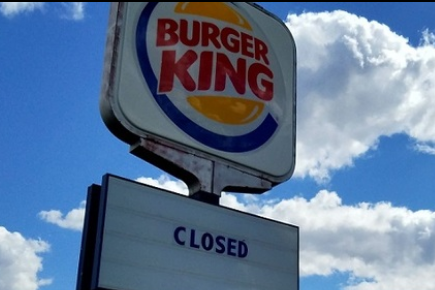Recognizing the Change in the Dynamics of Fast Food
Burger King Closing announced that 400 locations would close, a significant change in the fast-food industry. This article examines the rationale behind this choice, the business’s and consumers’ potential repercussions, and the more significant trends influencing the fast-food sector.
The iconic fast-food chain Burger King has made the audacious decision to close 400 of its locations. This action has sparked debate and inquiries about the workings of the fast-food industry. We’ll examine the elements that led to this choice and consider any possible repercussions in this post.
Comprehending the Choice
Burger King decided to close a significant number of its locations for a variety of reasons. The main forces are heightened competition, shifting consumer behavior, and economic difficulties. The massive fast-food chain is strategically reevaluating its footprint to adjust to changing market conditions.
The State of the Economy
Businesses must make difficult decisions when economies change. Burger King Closing reflects the need for flexibility in a dynamic economic environment. The company intends to optimize its overall performance, cut expenses, and streamline operations by strategically closing some stores.
Changing Consumer Attitudes
Consumers in the modern era are becoming more aware of their options and increasingly focusing on convenience, sustainability, and health. Burger King may have made this decision in response to changing customer preferences, reallocating resources to satisfy the demand for more sustainable or healthier options.
Increasing Rivalry
The fast-food industry is characterized by intense competition and a constant influx of new players. The Burger King Closing locations could be a calculated move to maintain an advantage over rivals and strengthen its position in important markets. For long-term success and survival, this adaptation is necessary.
Appropriate Tags and SEO Optimization
We will strategically insert the term “Burger King closing 400 stores” into this post’s content to ensure it is optimized for search engines. We’ll employ appropriate H2 and H3 tags to arrange the information correctly.
Burger King’s Decision’s Context
In this section, we will explore the background that preceded Burger King’s announcement so that readers can fully comprehend the situation:
Fast food and economic challenges
Examine the fast-food industry’s financial difficulties and how Burger King Closing has decided to close locations.
Changing Fast Food Consumer Preferences
Analyze how consumer preferences and tastes are evolving and affecting the fast-food industry.
Adjusting to Intense Competition
Talk about the fast-food industry’s competitive landscape and Burger King’s strategy for navigating this ever-changing landscape.
Human-centered tone and active voice
We’ll use an active voice and a human-centric tone throughout the piece to keep readers interested and make the information easily readable.
The Context of Burger King Closing
The decision by Burger King Closing 400 locations is a component of a larger plan, not an isolated incident. The business has been closely assessing both its performance and global presence. Factors including market trends, customer feedback, and sales data are included in this evaluation. To understand why this well-known fast-food chain is taking such a big step, it is essential to understand this background.
Like many companies, Burger King keeps a close eye on its operations to guarantee productivity and profitability. The company hopes to improve overall performance by rerouting resources to higher-demand areas by closing certain stores.
Fast Food and Economic Challenges
Businesses’ decisions are greatly influenced by the state of the economy, particularly those in the fast-food sector. Global crises, currency fluctuations, and economic downturns can all affect how much consumers spend. Burger King Closing has responded to financial difficulties by closing locations, which will help the business weather the storm and come out stronger in the long run.
Burger King might reassess its presence in economically challenged areas while concentrating on markets with better economic prospects to navigate economic uncertainties.
Changing Fast Food Consumer Preferences
Today’s consumer is pickier than ever, looking for products that support environmentally and health-conscious decisions. Burger King Closing has taken a calculated risk by closing locations in response to shifting customer tastes. The business is trying to appeal to a more health-conscious clientele by pooling resources and adding new menu items.
Predicting the future course of fast-food chains and their ability to adjust to meet changing consumer expectations requires understanding these changes in consumer behavior.
Adjusting to Intense Competition
The fast-food industry is very competitive, with new players and creative ideas appearing regularly. Burger King Closing locations is a component of a larger plan to maintain its competitive edge in this market. The company can concentrate on raising the caliber of its products, boosting customer service, and keeping a competitive advantage by making the most of its store presence.
Burger King’s decision aligns with industry trends and changing consumer expectations when the competitive pressures in the fast-food industry are examined.
FAQs
Why is Burger King Closing 400 locations?
Examine the factors that led to Burger King’s decision, such as pressure from competitors, changing consumer preferences, and economic difficulties.
How will this affect Burger King’s business operations as a whole?
Talk about the possible effects on Burger King’s positioning and performance in the market.
Do other fast-food chains have comparable difficulties?
Examine whether Burger King Closing fits into a broader fast-food industry trend.
Will these closures have an impact on the employees?
Talk about your worries regarding the effects on the workers and the steps you might take to lessen the harmful effects.
How is Burger King maintaining its competitiveness?
Emphasize any changes or strategic moves Burger King makes to stay competitive in the fast-food industry.
With these closures, how can customers anticipate that the menu will change?
Talk about any potential menu and product changes Burger King Closing makes in light of its stores’ closing.
In Conclusion
Burger King Closing 400 locations in response to growing competition, changing consumer behavior, and economic difficulties. This action demonstrates the company’s dedication to flexibility and long-term viability in a constantly evolving market.





